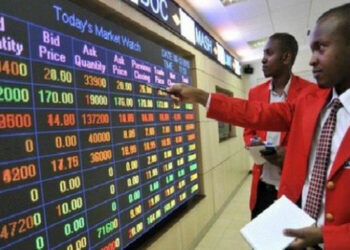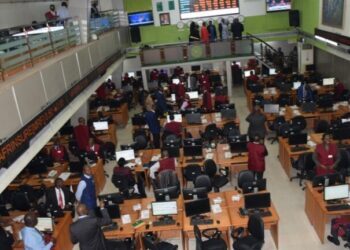The Nigerian stock market rebounded with positive momentum on Wednesday, adding N97 billion to investors’ portfolios.
Specifically, the market capitalisation of listed equities, which opened at N55.033 trillion, advanced by 0.18 per cent or N97 billion to N55.130 trillion.
The All-Share Index also increased by 0.18 per cent or 171 points to settle at 97,098.98, against 96,928.52 recorded on Tuesday.
Consequently, the Year-To-Date return rose to 29.86 per cent.
Market breadth also closed positive with 27 gainers and 22 losers.
On the gainers’ table, Redstarex led by 10 per cent to close at N4.18, Oando trailed closely by 9.98 per cent to close at N33.60 per share.
RT Briscoe and United Capital gained 9.90 per cent each to close at N1.11 and N16.10 per share respectively, while Industrial and Medical Gases added 9.87 per cent to close at N17.25 per share.
On the other hand, Neimeth led the losers’ table by 7.69 per cent to close at N1.80, Honeywell Flour followed by 6.10 per cent to close at N3.85 per share.
Sovereign Trust Insurance dropped 5.56 per cent to close at 51k, Deap Capital Management and Trust Plc declined by four per cent to close at 48k, and Ecobank Transnational Incorporated shed 3.72 per cent to close at N20.70 per share.
Analysis of the market activities showed trade turnover settled higher relative to the previous session, with the value of transactions up by 89.59 per cent.
A total of 636.50 million shares worth N12.77 billion was exchanged in 9,744 deals, in contrast to 449.21 million shares valued at N6.74 billion traded in 9,381 deals posted in the previous session.
Meanwhile, Access Corporation emerged as the most traded stock in volume with 112.62 million shares worth N2.11billion.
Also, Guaranty Trust Holding Company (GTCO) led in value with 74.34 million shares valued at N3.34 billion.(NAN











